FEATURED STORYHelp Marvellous Mangroves continue Sustainable Learning

CAYMAN ISLANDS – MAP is calling for donors to support teachers around the globe. For every $100 donated a teacher will be able to attend the Marvellous Mangroves three-day teachers’ workshop and provide them with a copy of the 300-page Marvellous Mangroves – adapted and translated for their own country. Support will go directly to helping the world’s children from these tropical lands not only learn all about Marvellous Mangroves, but will also give them a basic understanding of scientific methodology and ecology. In addition, they get to learn research methods as a precursor to a science-based university education. For more information and a short video about the program CLICK HERE
ASIA Editor's Note:
From November 6-9, MAP executive director Alfredo Quarto participated in a special symposium called "Turning the Tide on Mangrove Loss", organized by the Zoological Society of London. http://www.zsl.org/science/whats-on/turning-the-tide-on-mangrove-loss. Quarto gave a half hour presentation on the two decades of work MAP has done on behalf of the world's mangroves, which can soon be viewed on MAP's website.
After the symposium, members of the gathering who are part of the MSG joined together for two days to strategize on how best to proceed to conserve and restore the threatened mangroves. Quarto's proposal to carry out a global assessment of recent attempts at mangrove restoration was approved for further development, and it was agreed by the MSG members that this was a timely and much needed initiative. The MSG group also put forth the following declaration for the World Parks Congress meeting in Sydney, which is meant to influence future policy decisions on mangrove related issues:
Rehabilitating Mangroves in the Philippines

PHILIPPINES – ZSL started its mangrove rehabilitation work in 2007 through the Community-based Mangrove Rehabilitation Project (CMRP), with the aim of increasing coastal protection, food resources and diversifying livelihood options. This was achieved through empowering local communities to protect remaining mangrove forests and developing science-based methods for communities to rehabilitate lost forest sites. Over a four year period, close to 100,000 mangroves were planted, with the rehabilitation of 107.8 hectares of mangrove forest well underway. This project resulted in manuals that provide detailed biological and socioeconomic guidance on community-based mangrove rehabilitation and on fishpond reversion to mangroves. In the Philippines, most mangrove forests were lost due to the creation of fishponds for commercial fish and shrimp farming. Often these fishponds are then left abandoned and by law, this should mean they are returned to the Department of the Environment and Natural Resources for reversion. Unfortunately this rarely happens. ZSL has been working to have these Fishpond Lease Agreements (FLAs) cancelled and new healthy mangrove forests to be cultivated at these abandoned pond sites. READ MORE
Read the related story under the EUROPE category in this newsletter
Govt, Environmentalists Discuss Marine Protection Area
MYANMAR – Flora and Fauna International (FFI) said it held a meeting recently with representatives of several government ministries and the Tenasserim Division government to discuss plans for the creation of a Marine Protected Area in Mergui Archipelago, located off the coast of southern Burma. The two-day workshop, “discussed the biodiversity values of the Myeik [Mergui] Archipelago for Myanmar and the Andaman Sea, new research data from ongoing scientific assessments, key sites for marine conservation, and threats facing the ecosystems and fishing industry,” FFI said in a press release. Discussions also focused on how a Marine Protected Area can be a management tool for sustaining coastal fisheries resources. READ MORE
Which will win? Sundarban or harmful projects?

BANGLADESH – Recently, Bangladesh hosted a three day international conference on tiger conservation in Dhaka. Delegates from 13 tiger range countries attended the conference that began on September 14. Prime Minister Sheikh Hasina, in her inaugural speech, stated that her “government will do everything for conservation of the tigers.” These words sound rhetorical and absurd since the government has also been planning several projects threatening the Sundarban's survival, the main habitat of tigers in the region. People in general and independent experts, particularly from Bangladesh, have been expressing their concern and protest against these projects in many ways. Many research papers and investigative articles have specified the problems. Big local and national demonstrations, including 6 day Dhaka Sundarban long march, raised people's voices, artists have written songs and plays about the Sundarban. READ MORE
AMERICAS
ASPA calls for stricter shrimp labeling
USA – In the wake of Oceana’s U.S. shrimp-mislabeling study, in which the group found up to 30 percent of samples inaccurately labeled, members of the American Shrimp Processors Association (ASPA) are calling for further measures to ensure product integrity and quality. “We are encouraged that the problem does not seem to be at the producer/processor level. But the report does provide clear evidence that we need to expand our education, awareness and marketing efforts at the institutional and retail level,” said David Veal, Ph.D., executive director of ASPA. ASPA members represent the majority of domestic production of warm-water shrimp from the Gulf and South Atlantic waters. “While we have not yet been able to evaluate the quality of the science in the report, on the face of it, we are appalled by the numbers,” added Veal. “It is in our best interest for all shrimp to be represented properly. We actively encourage consumers — whether they are individuals, chefs, restaurants or retail buyers — to question the origin of their shrimp.” READ MORE
Antibiotics found in 'antibiotic-free' seafood headed for Arizona.
USA – Wild shrimp and farmed tilapia, trout, salmon and even farmed salmon marketed as antibiotic-free tested for detectable levels of antibiotics, a recent ASU study shows. Trace amounts of antibiotics have shown up in seafood that would have landed on grocery-store shelves in Arizona and California, according to an Arizona State University study published in Journal of Hazardous Materials. Wild shrimp and farmed tilapia, trout, salmon and even farmed salmon marketed as antibiotic-free tested for detectable levels of antibiotics, said Hansa Done, the report's lead author and a graduate student at ASU's Biodesign Institute. The levels of antibiotic residues found in the fish are well within the Food and Drug Administration's regulations for safe consumption, some 100 to 1,000 times lower than the limit, Done said. “But just because it's safe to eat, doesn't make it sustainable”, she said. READ MORE
Shrimp farming needs strict biosecurity protocols
USA – Several reports have been published recently that state that the current disease problems due to infection by an unusual strain of Vibrio parahaemolyticus that have severely affected the production of farmed shrimp is under control, and that those areas affected the heaviest are showing signs of recovery. Unfortunately this is not true and is little more than wishful thinking. This pathogen has very solidly entrenched itself, and while a great deal of work is being done to try and mitigate its impact, it is my opinion that it will continue to spread to unaffected areas and to impact production in those countries that are currently affected. This spread of the disease appears to be partly a result of a failure to implement proper biosecurity controls in the maturation facilities and hatcheries, and there is little to no chance that this will change, even in the face of the knowledge that this appears to be an opportunistic pathogen — loads of which entering into production environments can be mitigated. Add to this the current practices of pond preparation that damage the pond ecology – while ensuring that strains such as this have niches to readily grow in — and the fact that vibrio strains are readily moved throughout aquatic environments by currents, and you have a scenario where there is very little chance this disease will be easily or readily controlled. READ MORE
Women and Man(groves)

COSTA RICA – Real change often requires high-level planning and support. But sometimes all it takes is determination at the community level. On Costa Rica’s Chira Island, the hard work of women's collectives has resulted in the restoration and preservation of vital mangrove forests. One afternoon last spring I sat with my colleague Emily Pidgeon in a hand-built lodge on the outskirts of the town of Palito on the Costa Rica's Chira Island. We were there to speak with the women who founded the Chira Island Women’s Collective, a group committed to bringing income, education, and security to their island. Around us stretched a thriving coastal community that overlooks the Gulf of Nicoya, the country’s most productive estuary. The gulf is home to crocodiles, rays, egrets, and ospreys. And mangroves – more than half the island is covered, enriched and protected by lush mangroves. But the mangroves were under threat, the women told us, and we were here to see how women on the island had organized to make a difference. READ MORE
EUROPE
IUCN forms SSC Mangrove Specialist Group

NETHERLANDS – The recently established IUCN SSC Mangrove Specialist Group, aims to support mangrove research and conservation projects by bringing together experts in the field to share their knowledge. Hosted by the Zoological Society of London (ZSL), the group aims to; assess the conservation status of mangroves; identify, quantify and prioritise threats; and develop plans to conserve the most threatened species and habitats. The IUCN Mangrove Specialist Group, comprising of international experts in mangrove research and conservation, is working to a) assess the conservation status of mangrove systems; b) identify, quantify and prioritise threats; c) conserve the most threatened species and habitats; and d) disseminate best practices and share successful approaches for mangrove conservation, restoration and sustainable use. We recognise that protected areas are a vital tool for conserving mangroves, as part of the wider Global Action Plan under development by our group. READ MORE
For more information about this meeting follow this link VIEW ADDITIONAL INFO OCEANA More than a third of natural world heritage sites face 'significant threats'
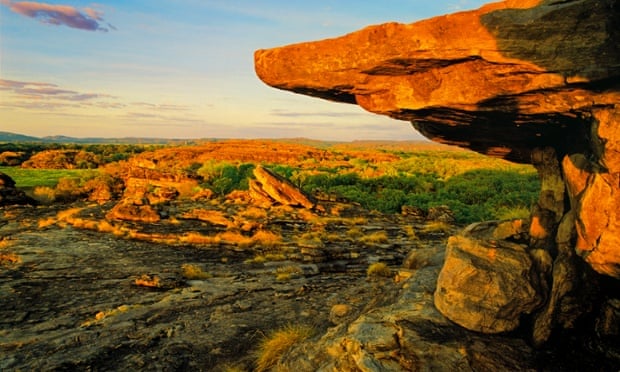
AUSTRALIA – More than a third of the planet’s natural world heritage sites face significant threats such as invasive species, logging and poaching, and climate change is a looming menace to prized ecosystems, according to a major new assessment. The first ever analysis of all 228 natural world heritage sites found that 21% have a good conservation outlook, with 42% deemed to be “good with some concerns”. However, 29% have “significant concerns” and a further 8% are listed as “critical”, which means they are deemed to be “severely threatened” and require urgent attention to avoid their natural value being lost. The IUCN World Heritage Outlook, released at the World Parks Congress in Sydney, found that 54% of world heritage sites are well managed, but 13% are seriously deficient in protecting species and landscapes. READ MORE LAST WORD(S) The below message is sent on behalf of Alizia Kamani, Wetlands International. Dear partner,
Today Wetlands International and The Nature Conservancy launches a new guidebook on the role of mangroves for coastal defence. Since the 2004 Asian Tsunami almost 10 years ago, we have come a long way and have found that mangroves can reduce risk from a large number of coastal hazards. In this new publication titled “Mangroves for coastal defence: Guidelines for coastal managers & policy makers” we provide practical guidance on the role that mangroves play in defence against waves, storms, tsunamis, erosion and sea level rise. Working with the University of Cambridge to review hundreds of scientific papers, the guide book translates in-depth knowledge into a practical approach for coastal decision makers.
Attached, please find the full press release. We hope that this will help you to mark the 10 years of the tsunami and also hope that you will circulate this among your colleagues and networks.
Thank you for your time and if you should have any questions, please do not hesitate to contact me.
With kind regards,
Alizia Kamani
Public Relations Officer and Web Editor
Wetlands International
P.O. Box 471, 6700AL Wageningen, The Netherlands
Tel: +31(0)318 660927
www.wetlands.org BACK TO TOP
Not yet a subscriber? Click here to subscribe. Please cut and paste these news alerts/ action alerts on to your own lists and contacts. Help us spread the word and further generate letters of concern, as this can make a big difference in helping to halt a wrongdoing or encourage correct action. | Action Alerts: The importance of mangroves to people: A call to action CLCIK HERE UK National Contact Point final statement on a complaint against a UK company developing plans for coal mining in Bangladesh CLICK HERE
MARVELLOUS MANGROVES IN BRAZIL
En Portuges
MAP VOLUNTEER Statement of Qualifications CLICK HERE WORLD WETLANDS DAY IS FEB 2, 2015 –
MORE HERE
Mamelo Honko Women's Association Update – your support has helped – VIEW REPORT Shrimp is the most consumed seafood in America, but how much do we really know about the shrimp we’re eating? Click here to call on the President’s task force to support seafood traceability and other strong measures to fight IUU fishing and seafood fraud – the task force is running out of time so act now! Development Coordinator Wanted
MAP is seeking a creative, energetic, and environmentally aware development coordinator to support administrative work and the QYS campaign in Seattle, Washington. READ MORE FREE MAP Mangrove e-cards CLICK HERE
 MAP’s e-Cards offer you a unique way to spread the word about MAP’s good works, while sharing beautiful photographs of the mangroves Mexican Everglades Threatened
A great threat looms over EVERGLADES NATIONAL largest mangrove area in the Mexican Pacific due to the interest of building the project: Canal Centenary and hydroelectric Las Cruces, in the state of Nayarit. Please spread this open letter to the President of the Mexican United States where we request the cancellation of the project. READ MORE
EN ESPANOL Information sheds clear light on shrimp-mangrove connection
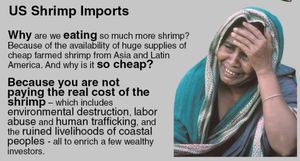
SEE DETAILS MANGROVE/SHRIMP CBEMR work on Klang Island, Krabi is Finally Underway – MORE INFO CALLING FOR MANGROVE ART SUBMISSIONS!
A fun and exciting Art Contest for children 6 to 16 years old. We invite all primary school children from tropical and sub-tropical nations, and whose schools are located near mangroves, to create art telling us “why mangroves are important to my community and me?”. Selected winners will be published in a 2016 calendar to be distributed internationally to raise awareness of mangrove forest ecology. READ MORE SHARE MAP'S VISION
CLICK HERE to watch short introductory video. Together we can work "at the roots of the sea". Join us in saving our beautiful country!
We hope you have been following the ongoing battle in Bimini, Bahamas.
We are in need of your help more than ever Click here
Exclusive Interview with Alfredo Quarto, Co-Founder and Executive Director of Mangrove Action Project – See more
MAP VOLUNTEERS NEEDED IN THAILAND VIEW REQUIREMENTS
Order your 2015 Calendar
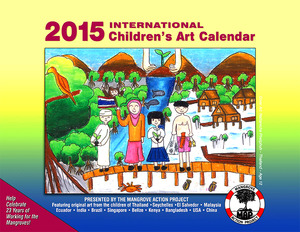
1-20 calendars, $12 each plus shipping
21-49 calendars, $10 ea plus shipping
50-100 calendars, $8 each plus shipping.
Over 100 $7 each plus shipping
Question Your Shrimp- Don't Buy or Sell Imported Tropical Shrimp! Sign the Petition Donate to MAP via Paypal
Giving could never be easier  It’s the action, not the fruit of the action, that's important. You have to do the right thing. It may not be in your power, may not be in your time, that there'll be any fruit. But that doesn't mean you stop doing the right thing. You may never know what results come from your action. But if you do nothing, there will be no result. —Mahatma Gandhi It’s the action, not the fruit of the action, that's important. You have to do the right thing. It may not be in your power, may not be in your time, that there'll be any fruit. But that doesn't mean you stop doing the right thing. You may never know what results come from your action. But if you do nothing, there will be no result. —Mahatma Gandhi Green Planet Fundraising Assists MAP – LEARN MORE
MANGROVE ISSUES View New Videos posted by MAP Asia intern, Delphine. CLICK HERE
The importance of restoring mangroves in an effective, long-term manner. Mangrove video – VIEWPlease view our new video for our Question Your Shrimp Consumer/Markets Campaign! It is now on our website under the Question Your Shrimp section heading. WATCH VIDEO Mangrove Restoration in Asia – Watch Short Video
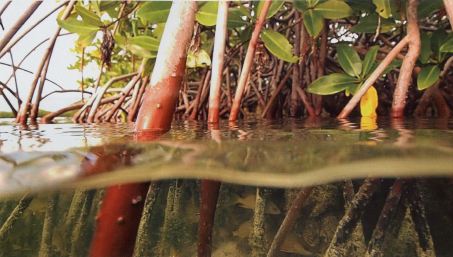
READ A MOSAIC OF LIFE” Peek into the underwater world of mangroves, "womb of the sea." By Liz Cunningham Photos By Wes Matweyew and Liz Cunningham View MAP’s uploaded Videos at MAPmangrover’sChannel
Marvellous Mangroves 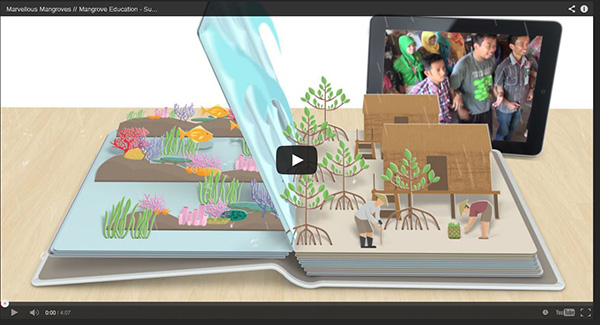
Marvellous Mangroves – A Curriculum-Based Teachers Guide.
FOR MORE ON MAPs AWARD WINNING CHINA MANGROVE CURRICULUM VISIT

VIMEO SHOW VISIT OUR "MM" WEBPAGE Check out our presentation for more details on Marvellous Mangroves “Education In The Mangroves" can now be seen on the PhotoPhilanthropy website here! Read this 10 page history of the development of MAP’s educational curriculum VIEW DOCUMENT
Article in Canada's Green Teacher Magazine – Read More
"Question Your Shrimp" Campaign Learn more about the affects of the shrimp industry on mangroves by visiting our blog Editor’s Note: Mangrove Action Project’s Executive Director, Alfredo Quarto was interviewed about shrimp by Green Acre Radio’s Martha Baskin LISTEN TO INTERVIEW
Join MAP on Facebook
Sign the Consumer's Pledge to avoid imported shrimp

Not yet a MAP News subscriber?
Click here to subscribe.
Note to Our Readers:
We strive to keep active links in our newsletter. However, due to circumstances beyond our control, occasionally links to stories may become broken. If you find a link to a story is not functioning, please cut and paste the headline into your browser search bar. In most cases you should be able to locate the original story.
Help Mangrove Action Project through your recycled E-Waste. List of Accepted E-waste Items: Injet Cartidges, Cell Phones, Pagers, GPS, Radar Detectors, Mobile Hot Spots, Calculators, eBook Readers, iPods/MP3 players, Digital/Video Cameras/Camcorders, PDAs, iPads/Tablets/Laptops, Video Game Consoles, Handheld Video Games Visit the Mangrove Action Project recycle website Click on the recycle button then click on the Download Shipping Label, and follow the instructions. 
|













